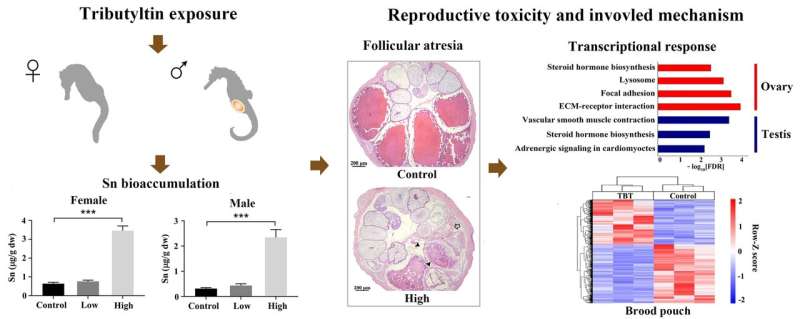Researchers reveal negative effects of tributyltin on the reproductive system of seahorses

Seahorses epitomize the exuberance of evolution. They have the unique characteristic of male pregnancy, which includes the carrying of many embryos in a brood pouch that incubates and nourishes the embryos, similar to the mammalian placenta.
The male pregnancy of seahorses is unique, but their reproductive response to environmental disturbances has not been clarified. Tributyltin (TBT) is known to have an endocrine disrupting effect on the reproductive system of coastal marine organisms.
Researchers led by Prof. Lin Qiang from the South China Sea Institute of Oceanology (SCSIO) of the Chinese Academy of Sciences evaluated the potential effects of exposure to environmentally relevant concentrations of TBT on the development of gonads and brood pouch of the lined seahorse (Hippocampus erectus). The study was published in Journal of Hazardous Materials on Dec. 15.
The researchers conducted physiological, histological, and transcriptional analyses, and found that high levels of TBT bioaccumulation occurred in male and female seahorses.
"TBT leads to ovarian follicular atresia and apoptosis with the elevation of androgen levels, accompanied by the induction of genes associated with lysosomes and autophagosomes," said Prof. Lin.
Comparative transcriptional analyses revealed the likely inhibition of spermatogenesis via the suppression of cyclic AMP and androgen synthesis.
"The transcriptional profiles show that TBT potentially affects the immune system, angiogenesis, and embryo nourishment of the brood pouch, indicating that it has negative effects on the male reproductive system of seahorses," said Prof. Lin.
The study reveals that environmental levels of TBT have the potential to affect the reproductive efficiency of seahorses, possibly leading to a reduction in their populations in coastal environments.
More information: Lu Tang et al. Effects of tributyltin on gonad and brood pouch development of male pregnant lined seahorse (Hippocampus erectus) at environmentally relevant concentrations, Journal of Hazardous Materials (2020). DOI: 10.1016/j.jhazmat.2020.124854
Journal information: Journal of Hazardous Materials
Provided by Chinese Academy of Sciences



















